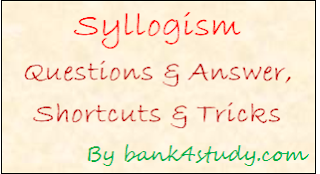Today, we are going to share notes on Syllogism, Syllogism topic which is one of the most important topics of reasoning in competitive exams.
Syllogism questions are very common and frequently asked in major exams like IBPS PO Clerk, SBI Clerk, SSC 10+2, SSC CGL, MAT, CMat etc. Through different kinds of Syllogism questions an examiner assesses candidates' reasoning skills and the more a candidate is aware of different approach the more will he able to solve a blood relation question fast and with ease.
Directions (1-5): In each question below are given two statements followed by two conclusions numbered I and II. You have to take the given statements to be true even if they seem to be at variance with commonly known facts. Read all the conclusions and then decide which of the given conclusions logically follows from the given statements, disregarding commonly known facts.
Syllogism questions are very common and frequently asked in major exams like IBPS PO Clerk, SBI Clerk, SSC 10+2, SSC CGL, MAT, CMat etc. Through different kinds of Syllogism questions an examiner assesses candidates' reasoning skills and the more a candidate is aware of different approach the more will he able to solve a blood relation question fast and with ease.
Directions (1-5): In each question below are given two statements followed by two conclusions numbered I and II. You have to take the given statements to be true even if they seem to be at variance with commonly known facts. Read all the conclusions and then decide which of the given conclusions logically follows from the given statements, disregarding commonly known facts.
1) If only conclusion I follows
2) If only conclusion II follows
3) If either conclusion I or II follows
4) If neither conclusion I nor II follows
5) If both conclusions I and II follow
1. Statements:
- All photos are snaps.
- All snaps are notes.
Conclusions:
2. Statements:
- All flutes are instruments.
- Some instruments are guitars.
Conclusions:
- No guitar is an instrument.
- Some guitars are flutes.
3. Statements:
- All cities are countries.
- Some trains are cities.
Conclusions:
- No country is a town.
- All countries are towns.
4. Statements:
- All stars are planets.
- No star is a sun.
Conclusions:
- Some planets are suns.
- No sun is a planet.
5. Statements:
- No officer is a lier.
- No lier is a woman.
Conclusions:
- No woman is an officer.
- All women are officers.
Answers for Syllogism Questions
Ans 1: only conclusion I follows
Ans 5: either conclusion I or II follows
Important Links Click Below
- Coding Decoding Questions Answers Set 1
- Coding Decoding Questions Answers Set 2
- Coding Decoding Questions Answers Set 3
- Coding Decoding Questions Answers Set 4
- 15 Puzzle Sets for Exams
- How to Solve Input-Output Reasoning Questions Fast
- Direction Sense Questions
- Blood Relations Questions - Shortcuts
- How to Solve Coding Decoding Fast - Shortcuts





